- Home
- Honest Lee
The Unlucky Lottery Winners of Classroom 13
The Unlucky Lottery Winners of Classroom 13 Read online
Copyright
This book is a work of fiction. Names, characters, places, and incidents are the product of the author’s imagination or are used fictitiously. Any resemblance to actual events, locales, or persons, living or dead, is coincidental.
Copyright © 2017 by Hachette Book Group, Inc.
CLASSROOM 13 is a trademark of Hachette Book Group, Inc.
Cover and interior art by Joelle Dreidemy.
Cover design by Véronique Sweet. Cover copyright © 2017 by Hachette Book Group, Inc.
Hachette Book Group supports the right to free expression and the value of copyright. The purpose of copyright is to encourage writers and artists to produce the creative works that enrich our culture.
The scanning, uploading, and distribution of this book without permission is a theft of the author’s intellectual property. If you would like permission to use material from the book (other than for review purposes), please contact [email protected]. Thank you for your support of the author’s rights.
Little, Brown and Company
Hachette Book Group
1290 Avenue of the Americas, New York, NY 10104
Visit us at lb-kids.com
First Edition: June 2017
Little, Brown and Company is a division of Hachette Book Group, Inc.
The Little, Brown name and logo are trademarks of Hachette Book Group, Inc.
The publisher is not responsible for websites (or their content) that are not owned by the publisher.
Library of Congress Cataloging-in-Publication Data
Names: Lee, Honest, author. | Gilbert, Matthew J. author. | Dreidemy, Joelle, illustrator.
Title: The unlucky lottery winners of Classroom 13 / by Honest Lee and Matthew J. Gilbert ; illustrated by Joelle Dreidemy.
Description: First edition. | New York ; Boston : Little, Brown and Company, 2017. | Series: Classroom 13 ; 1 | Summary: “Unlucky teacher Ms. Linda LaCrosse wins the lottery and shares her winnings with her class. The students fulfill their dreams with their newfound wealth, but they soon learn that winning the lottery is not all that lucky”— Provided by publisher.
Identifiers: LCCN 2016028103| ISBN 9780316464659 (hardback) | ISBN 9780316464642 (e-book) | ISBN 9780316464666 (library edition e-book)
Subjects: | CYAC: Luck—Fiction. | Lotteries—Fiction. | Schools—Fiction. | Humorous stories. | BISAC: JUVENILE FICTION / Humorous Stories. | JUVENILE FICTION / Social Issues / Friendship. | JUVENILE FICTION / Action & Adventure / General. | JUVENILE FICTION / Readers / Chapter Books.
Classification: LCC PZ7.1.L415 Unl 2017 | DDC [Fic]—dc23
LC record available at https://lccn.loc.gov/2016028103
ISBNs: 978-0-316-46465-9 (hardcover), 978-0-316-46462-8 (pbk), 978-0-316-46464-2 (ebook)
E3-20170427-JV-PC
CONTENTS
Cover
Title Page
Copyright
Chapter 1Unlucky Ms. Linda
Chapter 2Lucky Ms. Linda
Chapter 3Mason
Chapter 4Emma
Chapter 5William
Chapter 6Sophia
Chapter 7Santiago
Chapter 8Ximena
Chapter 9Jayden Jason
Chapter 10Lily
Chapter 11Jacob
Chapter 12Olivia
Chapter 13Classroom 13
Chapter 14Ava
Chapter 15Teo
Chapter 16Earl
Chapter 17Mark
Chapter 18Mya & Madison
Chapter 19Dev
Chapter 20Ethan
Chapter 21Chloe
Chapter 22Fatima
Chapter 23Yuna
Chapter 24Benji
Chapter 25Preeya
Chapter 26Liam
Chapter 27Isabella
Chapter 28Hugo
Chapter 29Zoey
Chapter 30Really Unlucky Ms. Linda
Chapter 31Your Chapter
CHAPTER 1
Unlucky Ms. Linda
When unlucky schoolteacher Ms. Linda LaCrosse woke up Monday morning, she decided it would be another unlucky day. And she was right.
First, she put too much milk on her toast and too much butter in her coffee. Then she forgot her umbrella. It wasn’t raining, but she used it to keep birds away. (For some reason, birds liked to swoop down at Ms. Linda and pull out her hair.)
On her way to work, Ms. Linda’s car got a flat tire. No one would stop to help. She didn’t have a spare tire, she’d left her phone at home, and it started to rain. When she walked to the nearest gas station to ask for help, the cashier was very rude. He snapped, “If you want to use my phone, you have to buy something.”
Ms. Linda looked in her purse. All she had was a single dollar bill. “What can I buy for one dollar?”
The cashier pointed to three items. The first was a candy bar. The second was a pine-scented air freshener. And the third was a lottery ticket.
Ms. Linda had a mouth full of cavities, so she passed on the candy bar.
Ms. Linda was very allergic to pine, so she shook her head at the air freshener (after a very violent sneeze).
So Ms. Linda chose the lottery ticket. Being unlucky, she tossed it in her purse without a second thought. She would not win. She never won anything.
After Ms. Linda paid for the lottery ticket, the cashier let her use his phone to call a tow truck and a taxi.
When Ms. Linda finally got to her school, she was soaking wet and very late. The principal gave her the evil eye as she rushed down the hall in her heels—click clack, click clack, click clack—all the way to her classroom. Her classroom was number 13—which, if you don’t know, is a very unlucky number.
“Oh, students, I apologize terribly for being terribly late,” Ms. Linda said. “I’ve had quite the terribly—I mean, terrible—morning!”
Of her twenty-seven students, twenty-six of them were present. Santiago Santos was at home with the sniffles. (The poor child was sick more often than not.)
Of the twenty-six students who were in class, only twenty-four of them were awake. Of those twenty-four, seven were playing video games on their phones. Of the seventeen left, four were gossiping (which is not nice), and three were drawing pictures of butts (which is hilarious).
Of the ten students left, four were playing on the Internet, three were talking about TV shows, two were reading comic books, and one was picking her nose. (She could almost get the booger, but it was just out of reach.)
But of all twenty-seven students, none of them were happy that their teacher was here. They were hoping for an entire day of goofing off.
Well, except Olivia. Olivia raised her hand but spoke without waiting to be called on. “Can we start today’s lesson already? I’m eager to learn.” Olivia was very smart, but she was also very rude.
“Of course, of course!” Ms. Linda said. She pushed her glasses up on her nose and tried to straighten her damp hair (which was a mess because of the birds). “What shall we learn about today? Let’s start with current events.”
“My dad says the only important news in the world right now is the lottery,” said Isabella. She had a horse on her shirt, a horse on her backpack, and a horse barrette in her hair. (Can you tell she liked horses?) “Right now, the lottery is worth twenty-eight billion dollars!”
“Oh my!” Ms. Linda said. She wrote 28,000,000,000 on the board. “That is a very big number indeed—after all, it has nine zeroes. Twenty-eight billion dollars is a lot of money. Who would like to do some math?”
“Boo!” some of the students shouted.
“Ce cours est nul!” shouted Hugo, who was from France and spoke only in French.
; Ms. Linda remembered her lottery ticket and pulled it out of her purse. “Let’s make it fun, then. This morning, I bought a lottery ticket. This lottery ticket cost one dollar. If I win two dollars, what percent is that?”
Only Olivia raised her hand.
“Do you think you’ll win?” Ximena asked. “I hear the odds of winning the lottery are less likely than the odds of getting struck by lightning.”
“I have heard the same thing,” Ms. Linda said. “It is much more likely that I’ll get struck by lightning than win the lottery. After all, I am very unlucky.”
“If you win, can I have some of the money?” asked Fatima.
“Ooh, me too!” said Jayden Jason James (who other students called Triple J).
All the students wanted some of the lottery money. Ms. Linda shrugged. “I tell you what, class. If I do win—which is very unlikely—I promise to split my earnings evenly with every single one of you.”
All the students in Classroom 13 shouted, “Really?!” (Except Hugo. He shouted, “Sacrebleu!”)
“Of course,” Ms. Linda said. “I made a promise, and I must keep my word.”
The students hopped up from their desks and huddled together in the middle of the class, whispering among themselves. Finally, they returned to their seats, and Ethan Earhart spoke up. “Ms. Linda? We value your word, but we would feel much more comfortable with your promise if we could get it in writing. Would you mind signing a contract and pinkie-swearing to share the money if you win?”
Ms. Linda thought creating a contract was a good lesson for the class. So together, they drew up a contract, which Ms. Linda and every student signed. Then, one by one, every student in Ms. Linda’s class walked to the front of the room and did a pinkie swear with Ms. Linda. For the rest of the day, the students were nicer than usual. Perhaps Ms. Linda’s luck was changing.
That day after school, as Ms. Linda walked home, she was struck by lightning—twice.
CHAPTER 2
Lucky Ms. Linda
When schoolteacher Ms. Linda LaCrosse woke up on Tuesday morning, she was in the hospital. She had survived both lightning strikes, and everyone kept saying, “You are very lucky!”
On Wednesday, when Ms. Linda LaCrosse woke up in her own home, she decided it would be a very lucky day for a change.
And she was right.
First, she put the right amount of milk into her coffee and the right amount of butter on her toast. Then she turned on her TV and saw the winning numbers for the lottery.
Ms. Linda LaCrosse had won.
When Ms. Linda received her winnings, she did exactly as she said she would and split the winnings with her students.
“Are you serious?!” asked Preeya.
“I am very serious,” said Ms. Linda LaCrosse.
“But why don’t you just take the money and run?!” asked Liam. “That’s what I would do.”
“Well, then it’s a good thing that I won and you did not,” said their teacher. She wore nice new clothes and had fancy laser eye surgery, so no more contacts. Her hair also looked very nice. Now that she had a limo and a chauffeur, the birds never had the chance to pester her.
“Are you really going to give us equal shares of the money?” asked William (who didn’t trust anybody).
“Of course,” said Ms. Linda. “A promise is a promise. What kind of teacher would I be if I didn’t keep my word?”
In this lottery, Ms. Linda was the only winner—which meant she now had $28,000,000,000 in her bank account. “Twenty-eight billion dollars divided by one teacher and twenty-seven students equals one billion dollars each—”
“Hold on!” shouted Ethan. He held up the contract. “You only made a promise to the students who were in class that day! Santiago Santos was home sick.”
“Yeah!” the students shouted.
“Wait, what?” said Santiago with a sniffle. (He was still sick.)
“But Santiago is part of our class,” said Ms. Linda, “even if he was home sick that day.” Ms. Linda wanted to be fair.
“Nope! No way! Nuh-uh,” the other students disagreed.
“Think of the Constitution of the United States and the Declaration of Independence,” said Ethan Earhart. He was a gifted speaker and a natural-born leader. “George Washington and Benjamin Franklin signed the Constitution. Santiago did not.”
“That is true,” Ms. Linda agreed.
“Thomas Jefferson and John Hancock signed the Declaration of Independence,” Ethan continued. “Santiago did not.”
“That is also true,” Ms. Linda agreed again.
“And only the students who were in class that day signed this contract. Santiago was not and did not.”
“That is also true,” Ms. Linda was forced to agree.
“Then I present a question before the courts,” Ethan said, as if talking to an invisible judge. “Would it be fair for Santiago Santos to take money for a contract he did not sign? We have a right to that money, but he does not!”
All the students—except Santiago, who was wiping a rather runny nose—clapped and cheered.
Ultimately, Ms. Linda had to agree. “I am sorry, Santiago Santos. But you were sick that day. And we did sign a contract. I’m afraid you will not get an equal share of my lottery winnings.”
For the next hour, Ms. Linda wrote a check to every student in her class—with one obvious (sniffling) exception.
Later that day, twenty-five students walked out of class with a check for over a billion dollars: $1,037,037,037.04 each, to be exact.
(You probably think I’ve made a mistake. But I haven’t. Trust me. My name is Honest Lee.)
The next day, no one showed up to class except for Santiago Santos. He was still sick, but he vowed to never miss a day of school again.
CHAPTER 3
Mason
Mason was not the smartest kid in Classroom 13. He was not the most handsome (that honor went to Mark, of course). And he was not the funniest. But, man, could he play sports.
He was a natural-born athlete but loved soccer the most. He was the county’s record holder for most goals in a single soccer game.
So, naturally, the first (and only) thing the school’s star soccer player bought with his $1,037,037,037.04 was a cow.
(Like I said, he was not the smartest kid in Classroom 13.)
Mason had been walking home from school with his check, when he met a farmer.
“Why the long face, son?” the farmer asked.
“Today I got a check for over a billion dollars, and I’m not sure what to spend it on.”
“Well, that’s easy,” said the farmer, with sly eyes. “Buy a cow.”
“A cow?” Mason asked.
“Of course! Cows are an investment. I have dozens of cows. Each one is worth millions. But this one right here? Daisy is special. She’s worth well over a billion dollars. Heck, maybe even more! She’s a friend for life. She can provide love and warmth all her days—not to mention all the milk you could drink! Add a little chocolate syrup, and boom! Ya got chocolate milk! Daisy here is priceless!”
Mason did like chocolate milk.
So he gave the farmer his check and took Daisy home.
Mason changed Daisy’s name to Touchdown. That way, anytime he called for her, she reminded him of scoring a goal in soccer. (Which was incorrect, since a touchdown was a goal in football. Like I said, Mason? Not the smartest.)
But the sly farmer was right about one thing: They were instant friends.
Mason and Touchdown played soccer together (though Touchdown didn’t kick the ball so much as just moo). They watched Netflix together (though Touchdown didn’t watch so much as just moo). And they walked to school each morning (during which time Touchdown stopped to eat grass and would occasionally—you guessed it—just moo).
Touchdown provided Mason with fresh milk every morning, and Mason cleaned up the big piles of poop that Touchdown left in his front yard.
The pair were inseparable. The perfect team.
&nb
sp; “I love you, Touchdown,” Mason said.
“Moooooo,” Touchdown mooed.
The soccer champ and the cow spent all day together, except at school. Even though they walked together, Ms. Linda wouldn’t let Touchdown in the classroom. “Classroom 13 already has a class pet,” Ms. Linda said. “Touchdown might make Earl the Hamster jealous. It’s best that Touchdown wait outside.”
Mason honored Ms. Linda’s wishes. He left Touchdown to roam freely, nap under the playground slide, and graze on the soccer field all day. Before long, this turned into quite the problem.
Within a month, there was no more grass on the field—Touchdown had eaten it all. Instead of a soccer field, there was just a giant mud pit. To make matters worse, the other soccer players kept complaining that their cleats were covered in “cow pies.” Mason didn’t understand the uproar—pie was a good thing, wasn’t it?
The school’s athletic department demanded someone pay for the damages.
Not having any money left, Mason didn’t know what to do. Luckily, Touchdown did. Touchdown took a day job as the school crossing guard. Nothing stops traffic quite like a cow in the middle of the road.
CHAPTER 4
Emma
When Emma Embry was a little girl, she begged her parents for one thing—a cat. She didn’t care if it was a Manx cat with no tail or an alley cat with one eye, all she wanted was a cat. (She was so desperate, she would have been happy with one of those scary-looking hairless cats.)
But Mr. and Mrs. Embry were “interior decorators”—which is just a fancy way of saying “people who get paid to tell you what furniture to buy.” And, yes, people paid Mr. and Mrs. Embry money (and lots of it) to tell them what kind of furniture to buy.
Because of their job, Mr. and Mrs. Embry were expected to have a perfect home. They had fancy furniture with long fancy names, like “Renaissance armoires” and “Louis XVI Baroque chairs.” They had silk drapes and velvet carpet. Everything in their home was expensive or priceless or one of a kind.

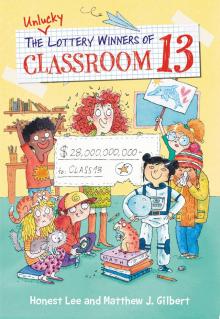 The Unlucky Lottery Winners of Classroom 13
The Unlucky Lottery Winners of Classroom 13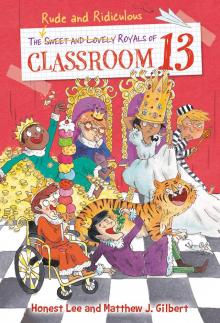 The Rude and Ridiculous Royals of Classroom 13
The Rude and Ridiculous Royals of Classroom 13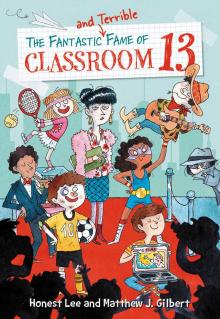 The Fantastic and Terrible Fame of Classroom 13
The Fantastic and Terrible Fame of Classroom 13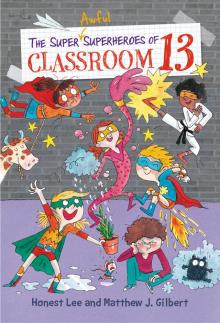 The Super Awful Superheroes of Classroom 13
The Super Awful Superheroes of Classroom 13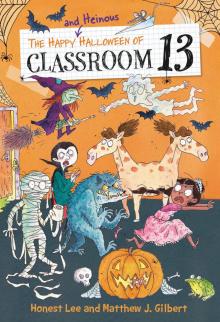 The Happy and Heinous Halloween of Classroom 13
The Happy and Heinous Halloween of Classroom 13